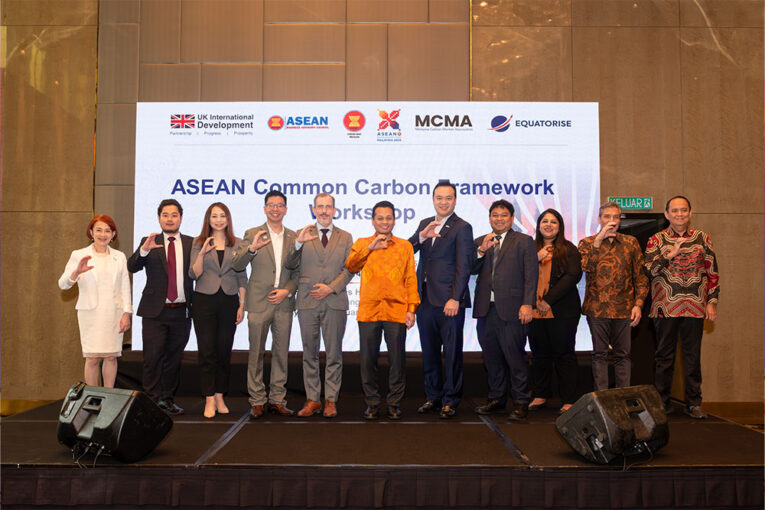
Kuala Lumpur, Malaysia – March 20, 2025 – ASEAN and the UK are working together to develop a regional carbon market that is transparent, efficient, and well-regulated. Today, key stakeholders gathered in Kuala Lumpur for the ASEAN Common Carbon Framework (ACCF) Workshop to advance this goal. Organised by the ASEAN-UK Green Transition Fund (GTF), the Malaysia Carbon Market Association (MCMA), and Equatorise Advisory as well as supported by ASEAN Business Advisory Council (ASEAN BAC); ASEAN BAC Malaysia and ACCF MoC Signatories, the workshop is a major step toward helping ASEAN countries trade carbon credits more easily and attract
green investment
In his keynote address, YB Nik Nazmi bin Nik Ahmad, Minister of Natural Resources and Environmental Sustainability of Malaysia, underscored the urgency and importance of advancing regional collaboration:
“The ASEAN Common Carbon Framework is a key catalyst to unlock ASEAN’s carbon market potential. It will drive mutual recognition of methodologies, enhance cooperation, and enable capacity building to ensure a transparent,
efficient, and competitive ASEAN carbon market.Malaysia is developing its National Climate Change Bill, which will soon be submitted to Parliament, as well as a National Carbon Market Policy to outline Malaysia’s participation under Article 6 of the Paris Agreement.
This national effort complements the ASEAN framework by helping to mobilize capital and support decarbonization opportunities within ASEAN. Today’s workshop is key to finalizing governance and setting a clear direction for our carbon market development. The two-year work plan will help expand participation across ASEAN, align policies, and support both voluntary and compliance markets.”
The workshop built upon the momentum from the Scaling Up Carbon Markets in ASEAN: Fundamentals & the ASEAN Common Carbon Framework Training held in Singapore earlier this month. It brought together high-level officials, experts, and private sector leaders to
finalize the governance framework, establish a two-year work plan, and formulate a strategy to secure high-level endorsements from ASEAN mechanisms and member states.
The UK reaffirmed its support for regional cooperation through its ambassador to ASEAN, H.E. Sarah Tiffin, who stated:
“The UK wholeheartedly supports a common approach to carbon markets across ASEAN. And through the ASEAN-UK Green Transition Fund, we’re supporting the signatories of the ASEAN Common Carbon Framework Memorandum of Collaboration and the ASEAN Business Advisory Council to develop the governance framework for the ASEAN Common Carbon Framework. Today’s workshop is a valuable opportunity to build on this collaborative approach.”
H.E. Satvinder Singh, Deputy Secretary-General of ASEAN for ASEAN Economic Community, further highlighted the progress made and the path ahead:
“Some ASEAN Member States, including Malaysia, Singapore, and Thailand, have already adopted various carbon pricing instruments, such as carbon taxes and voluntary carbon credit systems, and launched domestic exchanges for carbon trading.
Developing interoperable carbon markets is one of the eight key strategies under the ASEAN Strategy for Carbon Neutrality. While ASEAN Member States have made progress with national carbon markets, a regional framework can further amplify our impact.”
During the workshop, Dr. Renard Siew, President of the Malaysia Carbon Market Association (MCMA) and Group Head of Corporate Sustainability at Yinson Holdings, elaborated on the core principles of the ACCF:
“Within the framework, there are really five key elements. First is the recognition that there are existing localized methodologies. For example, Thailand has about 70+ methodologies, Indonesia 50+, and Malaysia where we’re starting with our Forest Carbon Offset Protocol.
These methodologies need to be of high quality and integrity, and hence there is an expectation for us to also align ourselves with standards like Integrity Council for Voluntary Carbon Markets (ICVCM), one of the multi-lateral initiatives which has mooted the CCP (Core Carbon Principles). We have to align ourselves with IOSCO’s 21 Good Practices for VCM, among others.
We also need to focus on mutual recognition, which is key to the ASEAN Common Carbon Framework, and to explore how different ASEAN Member States can acknowledge and accept the different methodologies that exist within the region.”
Steven Marcelino, Managing Partner and CEO at Equatorise Advisory and ACCF Secretariat, emphasized the importance of the session:
“This workshop is a critical step in strengthening this regional collaboration refining market structure, and also ensuring the successful implementation of ACCF across ASEAN Member States. This workshop is organized byASEAN-UK Green Transition Fund (GTF), Malaysia Carbon Market Association (MCMA), and Equatorise Advisory. We are delighted to be an implementing
partner for ASEAN-UK GTF.”
With global carbon credit demand projected to reach billions of credits annually and prices expected to exceed $200 per ton by 2050 (BloombergNEF, Long-Term Carbon Offsets Outlook 2024 report), the workshop was a critical step forward. Discussions focused on
finalizing the ACCF governance structure, establishing workstreams and milestones, and engaging in strategic dialogues on supply-demand dynamics, market infrastructure, regulatory alignment, pilot projects, and communications strategies.
As the region continues to align efforts toward climate neutrality, the ACCF Workshop marked a bold move toward regional unity in carbon market development, reflecting ASEAN’s commitment to scaling up carbon markets with integrity, transparency, and inclusivity.